
“The Good Indian Girl Special Offer” by Annie Zaidi and Smriti Ravindra on Ganxy
by Trisha Sakhuja – Follow @Tsakhuja13
Who is a “good Indian girl” and what is she like? Is she a myth? Does she ever think of or do bad things? Can a “good” Indian girl be considered “bad?”
Most boys grow up with their friends pondering these very questions, and some find the guts to stray from their pack to try and woo the “good girls,” but does a good girl immediately become “bad” if she coyly reciprocates the interest?
It’s so easy for girls, who were born and raised in the Indian subcontinent, to gain a good or tainted reputation. All it takes is some name-calling, secret glances at a boy and not submitting to her parent’s strict rules. In this funny, wicked, touching, irreverent, poignant collection of stories, “The Good Indian Girl,” authors Annie Zaidi and Smriti Ravindra, lift the veil (or sari pallu) on the lives of girls from India.
Want to read the many stories “The Good Indian Girl” highlights? Brown Girl Magazine and Diversion Books are proud to offer an exclusive sale of the e-book for only $2.99. Order your e-copy today because these stories will ring a bell with any woman who has negotiated the minefield of family love, romantic longing and desire that lies between childhood and womanhood.
Zaidi writes poetry, fiction, non-fiction, drama, blog posts, reports and reviews. Ravindra too writes fiction and teaches creative writing. Together, they wanted to tell that stories that answers one question: How does one get labelled “good’ or “bad?”
On the quest to answer this burning question, they set out to collect memories of many women and men, who confided in them to treat their stories with kindness. Zaidi and Ravindra’s fiction of real life stories of shy school girls living in a small town with gutsy, and sometimes perverted boys looking for trouble, was published in 2011.
One of the big question’s the book starts with is:
What is generally acknowledged as desirable behavior for a girl on the Indian subcontinent?” (p. 12)
Any guesses?
If you guessed her virginity, then you are right! As a young Indian girl, if you’ve lost your virginity, well “you’ve also apparently lost the right to be called a ‘girl.'”
Ah, virginity! If we could have our way, we’d make sure that even married women stayed virgins.” (p. 13)
After reading stories like, ” Finger Play,” “Panty Lines,” “Good Boys,” “Virgins:1,” “Stains,” and “Name Games,” it made me wonder – did my mother also live a life where she was told not to speak to boys, was submitted to wear certain clothes and was ordered to reach home before the sunset? (That almost sounds like my life as a girl). Did she too have a hidden naughty past where she shimmied down drainpipes at midnight and chased boys armed with sticks down the street?
It was amusing to read about Deepti and Preeti, from the story “Finger Play,” who took a stance against the pack of boys who called them names like “Morning Glory” and “One Hot Chilly” and watched them through a pair of “American” binoculars. The girls were surprisingly not afraid to walk by them, stick out their tongues and put up their middle fingers. Even though Deepti thought one of the boys looked just like Hrithik Roshan, so much so that she named him after the Bollywood actor. Yet, she dared not show him her loving side or even reveal her real name. To him, she was named “Your Sister.” After all, she was a “good girl” who was just having some fun.
It may not be the same as a bad boy’s idea of fun. On the other hand, maybe it is.” (p.17)
More amusing was reading Reeta’s story, from the perspective of Angad. Angad, who was featured in “Name Games,” recounts the first time he started thinking about “good” girls. He vividly remembers bumping into Reeta the day his bicycle broke down. It was right before the boy’s violin class started and after the girl’s violin class ended, that he would meet the infamous Reeta. To Angad’s surprise, his friend later told him that knowing Reeta’s name was no big deal.
Everyone in this town knows Reeta. Even the paan-walas and the rickshaw-walas. She talks to anyone, tells them her name.”
So was revealing your real identity considered “bad?”
Angad goes on to tell Mehek’s story – the girl who was brave enough to make a scrapbook of Bollywood film stars.
Somebody was sure to disapprove of the scrapbook, probably her own parents. I thought of her sitting at home, sifting through film magazines, cutting out photos, gathering trivia. It must have taken a certain amount of courage to waste time so outrageously, so exquisitely uncaring of what anyone might think or say.”
But what happened when Angad asked Mehek to look through her scrapbook? He felt a sudden urge when he couldn’t stop staring at the picture of famous Bollywood heroine Sridevi wearing only a towel and her finger “caught saucily between her teeth.”
She looked at the page I was on, then she looked at me again, and suddenly she started blushing furiously. I felt strange, as if I had done something inappropriate. So I closed the book and went to sit at my own desk.”
Wonder what Mehek did with her scrapbook after that embarrassing incident? Order your copy to find out. This offer is exclusive to BG and available only for a limited time offer!




